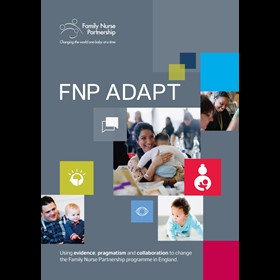We were really keen to get involved in the ADAPT project
Lorette Runacres, Supervisor, Bromley
We were really keen to get involved in the ADAPT project as it expanded in 2018. We were already grappling with some aspects of a more personalised approach that were being tested in ADAPT. We had taken on a client late on in pregnancy (as an exception to standard eligibility criteria), and we were wrestling with the sense that we had clients who could still derive benefit from the programme but for whom the usual frequency of visits was a challenge because of work or education commitments, often resulting in disengagement and attrition.
How we implemented change
We spent a lot of time thinking and preparing as a team, reviewing the materials, doing skills practice, role-playing how we’d use the tools and thinking about what this would look and feel like with our real life clients. We perhaps took a little longer to get going and implement change because we wanted to feel confident about delivering this new way of working with the clients.
With early graduation, for instance, we wanted to make sure we weren’t saying goodbye to clients who would go on to need extra support. The supervision guidance and paperwork provided by the FNP National Unit has really helped with this, including a checklist of questions which guide the family nurse and supervisor to consider what factors have led to the decision to offer early graduation. We document this decision in the client’s record.
How data support implementation
Regular calls with the ADAPT project team enabled us to review our team’s data during the course of the project. It help to make us think about what we were doing and how we were doing it. Early on in the project, it revealed that different FNP teams were flexing programme content in different ways. Being able to see this and talk about it with teams meant that the FNP National Unit could respond and reissue guidance to help improve consistency. It reminded us as a team that we needed to go back to core guidance regularly.
The challenge when you’re implementing something at pace is that you work on one aspect of it and you think “we’re ok, we’ve nailed it.” But if you don’t come back to it, it can drift or get lost. Seeing our data sometime prompted us to go back to skills practice and revisit a particular aspect of the programme.
How the FNPNU supported implementation
The clear guidance and communications from the FNP National Unit has been so helpful. It helps to drive consistency across FNP teams, while taking local context into account, and makes it feel like we – as an individual team – are connected to a bigger FNP community. The FNP National Unit recognised the need for change to ensure the programme remains fit for purpose, and it has led that work with care and integrity, true to the ethos of FNP. It has provided that structure and scaffolding to help enable change to happen. For teams, when it’s done like this – a big change delivered in a planned, supportive way – even though it’s a lot of work, it feels containable. As a team, we really enjoyed being part of this.
My advice to other FNP teams beginning on their personalisation journey
My advice to FNP teams who are about to begin their journey to personalise FNP for their clients is to invest some time up front to think about how you’re going to implement it. The commitment and can-do attitude of our FNP team in Bromley really helped drive things forward, and we pulled together - and learned together - to embed change. Our quality support officer played a critical role in changing the way we organised our information and materials. This might sound pretty functional, but it made a huge difference to nurses to have this strong administrative support – it freed them up to focus on making changes to practice safely and at pace. I heard that other FNP teams found it harder and took longer to implement change, when they didn’t have this kind of administrative capacity available to them.
Being part of the ADAPT project has been huge for us as a team and we took it on top of all the other things we are responsible for. When I look back, I realise that this was a really big piece of work, both in size and significance, in terms of what we’ve achieved and what we’ve contributed. It was great to be part of something that will help change and improve FNP for young families right across England.
